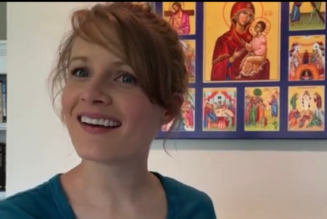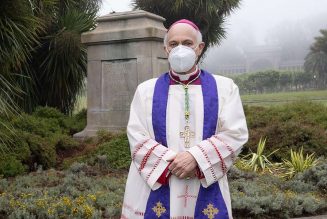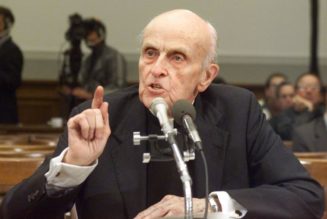By Dr. Jeff Mirus ( bio – articles – email ) | Aug 24, 2023
In a recent Angelus address, Pope Francis highlighted Our Lord’s willingness to “change his mind” about healing the daughter of the Canaanite woman in response to her pleas, as recounted in Matthew’s gospel (15:21-28). Thus, the Pope recommended Christ as a model for avoiding what Francis so clearly regards as a capital sin: Rigidity. Our news story on this particular address already provided background information showing that former saintly commentators on the text had interpreted Christ’s response to the Canaanite woman as a way of eliciting a statement of profound faith, not as a change of His own mind or heart. In other words, the Pope’s interpretation appears to be strained in support of one of his favorite themes.
I wish to look at this issue of “rigidity” more closely, because I am certain it is very commonly misunderstood. Indeed, I am convinced that the Pope himself has never described the issue very well. We are all familiar with Pope Francis’ repeated emphasis on what he regards as the sin of “rigidity”—though at times he seems to be inconsistent in denouncing as sinful what he also commonly regards as a psychological condition. But in this same Angelus address, he made a helpful point which I had not heard him make before, when he remarked: “Is there some rigidity in my heart? Which is not firmness: rigidity is awful, firmness is good.” It would seem, then, that the Pope is able to praise firmness while denouncing rigidity. How, then, are we to perceive the difference?
I cannot say how Pope Francis, were he actually to speak with meticulous clarity on this subject, would describe the difference. But I believe it is important to emphasize both that there is a difference and that Pope Francis has exhibited a personal prejudice when he seeks to differentiate the rigid from the firm (even though he only rarely praises anyone for being firm). Nor do I think this discussion is arbitrary or unnecessary, for Pope Francis, in case after case, has condemned “rigidity” only in those Catholics on one side of today’s contentious Catholic issues. I am speaking here of the Pope as a man, and not at all touching upon his teaching authority.
If I were to use the language of software, I would wryly insist that this is a feature of the current pontificate, and not a bug—in other words, this is a human feature of the man who has been elected pope, and not a magisterial bug. A failure to keep this in mind would raise unanswerable questions.
Psychological rigidity
Now, obviously, there are many people who suffer from what we would normally call “inflexibility”, which is clearly one meaning of “rigidity” for Pope Francis. In fact, most of us suffer from a normal human condition in this regard—the condition of wanting things to be how we want them to be, which also entails a difficulty in adjusting rapidly to contradiction or changes of plan. Such reactions are humanly normal, but some find it far harder than others to respond graciously to differing plans, tangential ideas, or just plain disagreement.
This is largely a matter of temperament, but as with all aspects of a reasonably healthy personality, we can learn to take the rough edges off of our personalities, and substitute good habits for bad, through intentional practice and prayer—that is, through the formation of both interior and exterior habits. But it has been notable from the first that Pope Francis, speaking as a man, does not see this problem with particular clarity. It is evident, from the first ten years of his pontificate, that he instinctively judges those who react in “conservative” ways to be rigid, while instinctively regarding those who react in “liberal” or “progressive” ways to exhibit a far more charming spiritual flexibility. In this, it seems inevitable to notice, he is apparently quite culture-bound.
What is troubling in Francis’ personal approach to the issue is that it is too often a matter of prejudice, the prejudice of a person who—regardless of what his intellect may tell him in any given moment—is far more comfortable with liberals than with conservatives or, to put the matter in a more accurate Catholic context, more comfortable with those who are undisturbed by dissent from Catholic teaching than with those who find such dissent both unsettling and in need of correction. To take perhaps the most egregious example, it is precisely this distinction which explains why Pope Francis can go out of his way to praise the efforts of LGBTQ+ Catholics and Catholic groups (and those who minister to them very deliberately under these headings) without at the same time explaining that the corresponding behaviors, including all tendencies to define the human person in accordance with these behaviors, are seriously sinful.
For a very recent example, see yesterday’s news story: Pope congratulates Australian LGBTQ+ Catholic group. The problem , of course, is not that some people are afflicted with these temptations, but that the Pope seems to think those who facilitate a self-identification with and acceptance of the corresponding sins are demonstrating something special about what it means to be a Catholic. Thus priests, nuns and lay people who have worked toward the acceptance of the LGBTQ+ ideology within the Church are considered open and creatively flexible, and those who protest and work against it are considered distressingly (and at times almost damnably) rigid.
Spiritual rigidity…and vacuity
Now, all this confusion about “rigidity” (or closedness) and “flexibility” (or openness) masks a far deeper problem, a problem within which it is not so easy to separate the wheat from the chaff. Certainly, we can identify psychological rigidity in ourselves and others: The priest who insists that everything must be done his way; the parent who confines his family to behavior patterns which allow little room for growth; and each one of us when we become upset and angry and perhaps a bit self-righteous about the insufferable behavior of those who contradict us or interfere with our precious plans. But these character flaws are natural to a process of emotional and spiritual maturation which includes innumerable failures along the way—and certainly, whether through sin or psychological debility, some of us are at times effectively incapable of that growth.
Moreover, there is also the broader reality that most of us have a tendency toward spiritual rigidity in that we instinctively identify our own spiritual preferences (among many spiritual preferences perfectly acceptable to Christ and His Church) with sweetness and light, while denigrating the preferences of others as immature, foolish, dark, or evil. Consider the liturgy wars as perhaps the most prominent of public examples, with reference to either our own experience or the experience of those caught up in the Syro-Malabar dispute (e.g., Syro-Malabar faction demands ouster of papal delegate). If we have retained a fundamental humility about our own liturgical and spiritual preferences, this example helps us to recognize that rigidity can affect those on all sides of any given question.
We should also notice that rigidity can affect “liberals” as well as “conservatives”, who simply have built-in tendencies to be rigid about different things. The deeper issue, most of the time, is that we have a very worldly way of assessing rigidity—or at least the dominant culture does. One would have to be blind not to realize that this same human tendency affects Pope Francis himself, which is one reason, of course, that Our Lord promised a special protection to the specific and precise exercise of the teaching authority of His Church. In a word, it is not only lay people, religious, deacons, priests, and bishops who are human, but also the pope himself.
The main issue here is that the worldly way of assessing the tendency of rigidity means that those who defend what is now out of favor culturally are routinely condemned as inflexible or rigid (in other words, “closed”), while those who change their spots with every cultural shift are praised as flexible or responsive (in other words, “open”). Our culture, at least, applies the dreaded tag of “rigidity” to the former without realizing that the latter are very frequently more blindly rigid in their constant accommodation of their thoughts and values to whatever the powers of this world wish them to be.
But which one of us really has an open mind and heart? Which one is really willing to take off the comforting cultural straight jacket—to risk being different from the herd in an authentically personal and responsive way? Might we not exemplify a more authentic flexibility by our very refusal to approve each new faddish moral trend, and so remain more open to that grace which makes us as free as God Himself?
Moral flexibility is a virtue only when it is exercised in the service of God and the Good. When we can quickly shed attachment to sin and falsehood in the service of virtue and truth, we have not only the flexibility but the freedom of the children of God. Human rigidity, in the deepest sense, consists in the inability or refusal to respond promptly to God’s will. This is, I believe, precisely what Pope Francis thinks he means when he uses the term, along with a “firmness” in learning, upholding and adhering to that will. But true as this may be, it also shifts the problem to another plane: How do we know God’s will? And on that essential point, especially in culturally unpopular matters, the current pope is seldom either as emphatic or as clear.
Sound Off! CatholicCulture.org supporters weigh in.
All comments are moderated. To lighten our editing burden, only current donors are allowed to Sound Off. If you are a current donor, log in to see the comment form; otherwise please support our work, and Sound Off!











